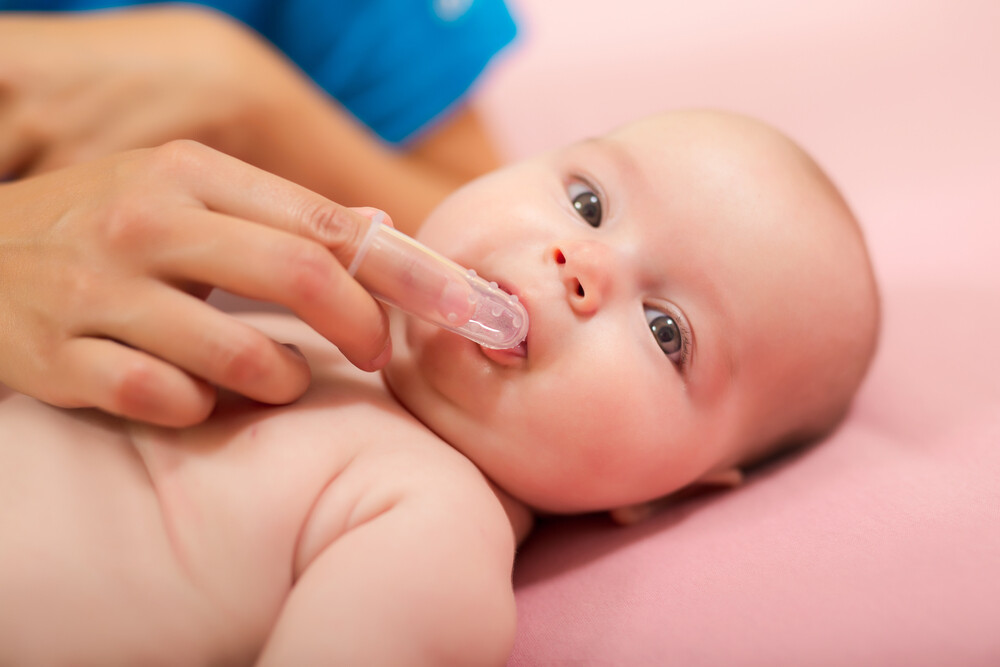As soon as the first little tooth breaks through, you should start caring for your baby’s teeth. As with older children and us adults, the youngest babies now also need to brush their teeth twice a day.
Most babies get their first milk teeth when they are about 6 months old. Some are earlier, others later. Even if the first teeth do not appear until around the first birthday, you do not need to worry.
The important thing is: Oral hygiene is important from the first milk tooth onwards.
First teeth: What do you brush them with?
There are several ways to keep the little teeth clean and healthy:
- Dental care with a fingerling (available in the baby department in the drugstore) and water
- Cleaning with a damp cotton swab or clean washcloth
- Brushing your teeth with an extra soft baby toothbrush especially for the first teeth
Tip: Most babies find toothbrushes exciting and love to chew on them – especially when the next teeth arrive.
Brushing baby’s teeth in brief:
- From the moment the first milk teeth break through, brush your teeth twice a day, once a day with a rice-grain-sized amount of special baby toothpaste.
- From the 2nd birthday on, a pea-sized amount of baby toothpaste is used twice a day for the milk teeth.
- Brushing the baby’s teeth is of course the responsibility of the parents.
- The baby can lie on the changing table at first, but later it can be placed on the lap.
By the way: Even if you are still breastfeeding, brushing your baby’s teeth is important. Because breast milk contains sugar.
How do you brush your first teeth?
Dentists recommend the “KAI” method: first brush the occlusal surfaces, then the outer surfaces and then the inner surface of the teeth. The reason: Since the brushing pressure is strongest at the beginning, it is to prevent the gums from being damaged during dental care.
And dental floss? That’s where the spirits part company. Some say “yes, absolutely”, others “no, you don’t have to, as long as the milk teeth are not close together”. In any case, it can’t hurt to introduce even the youngest children to the use of dental floss at an early age.
When can children brush their teeth themselves?
At the age of 1.5-2 years your little darling is able to take the toothbrush in his hand and guide it. In the beginning this will happen quite uncoordinated, but with time your child will develop his or her skills. The important thing is: brushing teeth should be fun and should be taught by the parents in a playful way.
However, even if your child brushes his or her own teeth later on, you should always brush again to ensure that the teeth are thoroughly cleaned. It is not until the age of 9-10 that your child’s motor skills are sufficiently developed to enable him or her to brush all by themselves.
Good to know: Children imitate their parents when brushing their teeth. If you are a good role model, that is already half the battle.
Holes in the teeth are not necessary
This is because caries is not inherited, but the fungi and bacteria responsible for it are usually transmitted from parents to their children. Therefore: Please do not lick the pacifier or feed the baby with its own spoon. In addition, proper nutrition is very important from the beginning. Because even if it is only the milk teeth at first, damage to the milk teeth can also be transferred to the later, permanent teeth. This is why oral hygiene is so important from the first tooth onwards!
Toothfriendly nutrition: You should pay attention to
As long as babies are exclusively breastfed or bottle-fed and do not yet have milk teeth, there is nothing to consider from a nutritional point of view. However, if you have already started with supplementary food or if your child is given additional drinks, caution is advised. Above all, sucking continuously on the bottle (even with water) has an extremely unfavourable effect on oral hygiene. It is better to avoid sugary drinks such as juices or sweetened teas altogether.
Attention: There is also a lot of hidden sugar in special baby products, which can damage the teeth.
These include:
- Baby teas, especially granules
- Fruit bars
- Crushers
- Baby biscuits
- Cute baby food
A complete diet is recommended, because the teeth are already cleaned in part by simply chewing. And this in turn speaks for the early introduction of finger food.
Tip: Longer breaks between meals prevent tooth decay, as the PH value in the mouth can then rise again and the oral flora normalises.
Fluoride prophylaxis through tablets or toothpaste?
Vitamin D is important for babies in their first year of life. This is why most parents get the tablets at the hospital for use at home. The tablets are also available with fluoride added, which are then called D-flourets. In the meantime, fluoride administration for babies has become very controversial, as oral administration often causes enamel problems in the teeth. Dentists therefore recommend that fluoride should only be added directly over the toothpaste from the first tooth onwards. For babies use baby toothpaste. It is very mild and contains less fluoride than toothpaste for adults.
Visit to the dentist: The first appointment is due
In the second year of life, you should make the first appointment with the dentist for your offspring. Normally you do not have to worry about your teeth yet. But your child can already get used to going to the dentist. In many places there are also special pediatric dentists who specialize in treating small patients or you can simply take your child with you the next time you go to the dentist yourself. The dentist will usually just look at the beautiful white children’s teeth together with the child, praise them and give a few tips on brushing.

